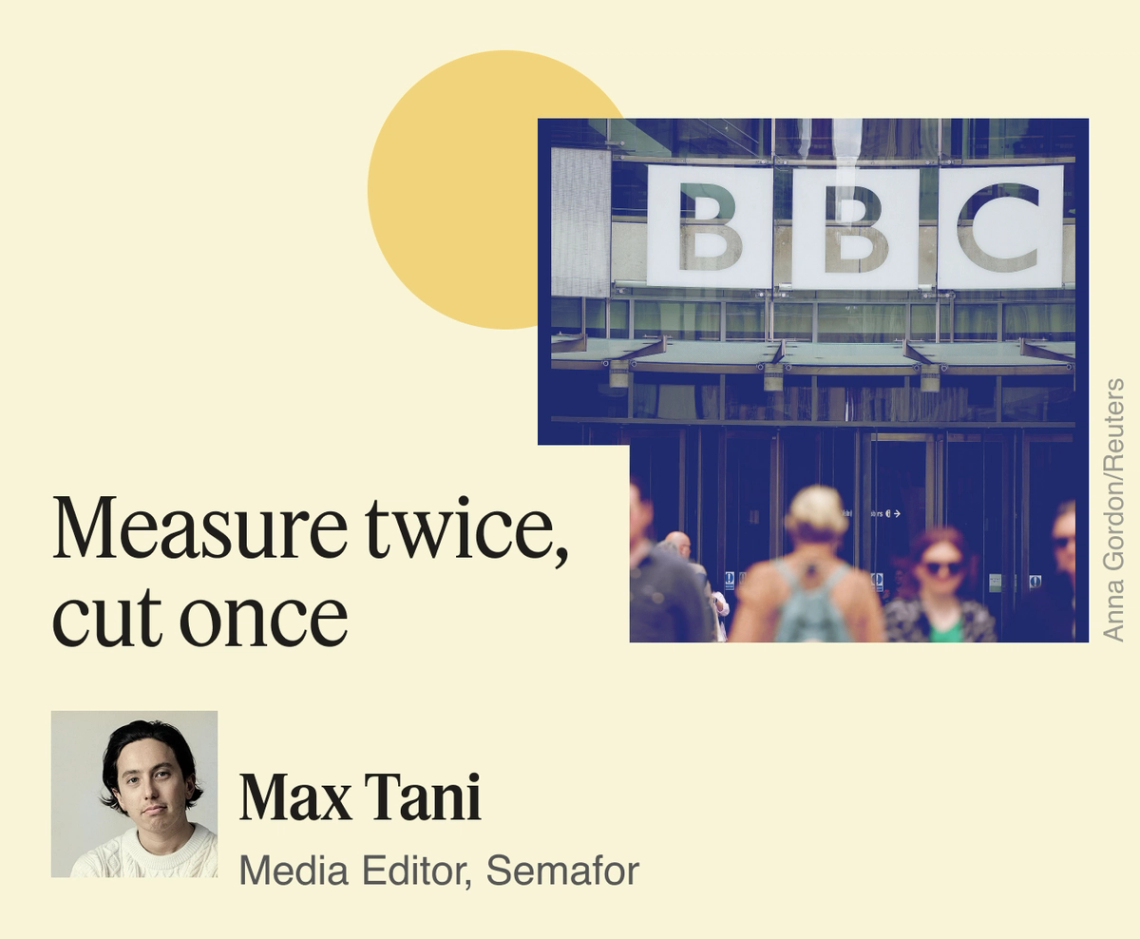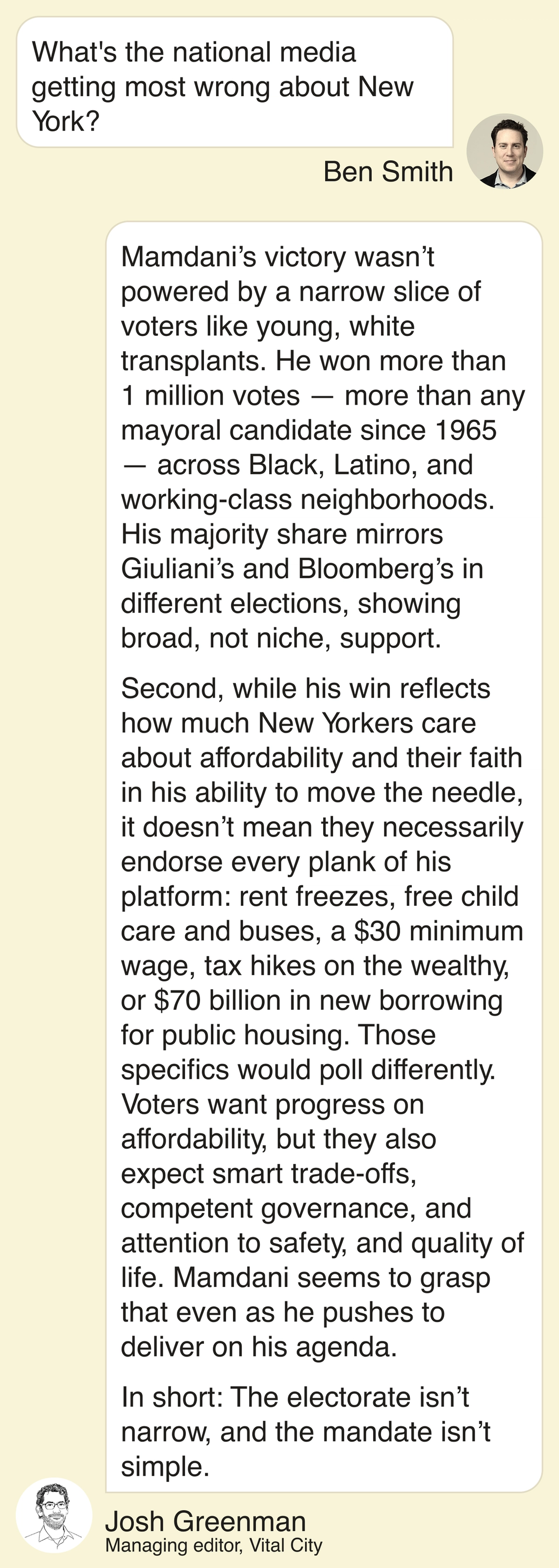| | In today’s edition: Axel Springer’s CEO on the hunt. ͏ ͏ ͏ ͏ ͏ ͏ |
| |  | Media |  |
| |
|
 - Axel springs eternal
- General queries
- WBD-Comcast
- Anti-Trump need not apply
- Strife at Condé
|
|
 Ten years into covering Donald Trump — I hope I don’t jinx myself and my peers by saying — American news media organizations seem to have mostly figured out how to cover Donald Trump. Take the contrast with our British media counterparts this week. On Sunday, the BBC’s director-general and the chief executive of BBC News resigned after the Telegraph revealed that the British broadcaster had misleadingly edited a Trump speech to remove his call for supporters to act “peacefully” on Jan. 6, 2021. After watching the offending BBC documentary clip, I think the Trump team has a point. Unlike the nonsense complaints about CBS News’ editing of former Vice President Kamala Harris’ 2024 interview, Trump’s words in the documentary were stitched together to amplify his rhetoric in a way that did not match exactly what he said onstage. (Even if the result — that his supporters proceeded to violently riot at the Capitol — is not seriously up for debate.) It’s a mistake you’re less likely to see from a major US news organization in 2025. Ten years in, American broadcasters and news organizations expect pushback from the president and his allies; tough stories and packages are edited more closely, and organizations come ready to defend pieces they know will receive intense criticism from the administration (see the X account for The New York Times’ communications department). News media organizations make mistakes covering Trump, and any subject, and will continue to do so. But if there’s any silver lining in Trump’s threats against the press, it’s that his campaign’s (and now, administration’s) aggression has forced many newsrooms to button up their reporting, at least when it comes to a guy who will almost certainly express his opinions about it. Also today: Axel Springer’s CEO looks for deals, and the latest from the WBD bidding wars. |
|
Döpfner on the hunt for deals |
 Axel Springer Axel SpringerAxel Springer CEO Mathias Döpfner has been busy. In the span of a week, the 62-year-old mogul bounced between his company’s stylish Manhattan townhouse (where he taped an episode of his podcast with Nile Rodgers and ran a board meeting), Business Insider’s headquarters (where he discussed his vision for the company’s use of AI), and the Axel Springer tower in Berlin (where he rubbed shoulders with National Football League Commissioner Roger Goodell). Since he sold off Axel Springer’s classified ad business and bought out his partner, Döpfner, whose company owns Politico as well as BI, has begun emerging as a new-school mogul: He’s ubiquitously public, has tons of cash, and is looking for deals, Max writes. He’s mused about buying CNN if it is spun out from Warner Bros. Discovery, one person said. Earlier this year, according to two people familiar, Döpfner discussed buying The Free Press (before Paramount bought it). He’s said he’s interested in Bloomberg Media. And his top target is The Wall Street Journal, if he can ever get it away from Rupert Murdoch. |
|
 Will Welch is the global director of GQ, and has been the editor-in-chief of its US operation since 2019. On this week’s Mixed Signals, Welch talks to Ben and Max about how the magazine plans to address men amid the prominence of the manosphere, the value in covering niche subcultures, and how the magazine’s parties operate as content creation mechanisms. Welch also talks about how he works with celebrities and praises Robert Pattinson as a more creative collaborator than he’s used to. |
|
Zaslav meets with Comcast brass |
 Mike Blake/Reuters Mike Blake/ReutersWarner Bros. Discovery CEO David Zaslav met with Comcast executives last week as the bidding war for WBD heats up, Semafor’s Rohan Goswami scoops. Zaslav, who last month publicly hung a for-sale sign on an empire that includes the historic Warner Bros. studio, HBO, and CNN, met with Comcast CEO Brian Roberts, people familiar with the matter said. The details remain unclear, but that there was a meeting at all suggests there may still be a path forward for a WBD-Comcast deal. (Spokespeople for both companies declined to comment.) Paramount has been bidding since October for WBD, a transaction that would elevate David Ellison’s nascent media empire into a Hollywood force. It would fuse Paramount’s film and streaming assets with the storied Warner Bros. content library and a streaming titan in HBO. Comcast’s Mike Cavanagh, who will become co-CEO with Roberts in January, told investors on last quarter’s earnings call that the bar is high for major M&A but that the company would have more room to maneuver once it completes the spinoff of most of its cable channels into a new company early next year. |
|
Speaking circuit mutes Trump criticism |
 Jerod Harris/Getty Images for Vox Media Jerod Harris/Getty Images for Vox MediaThe progressive commentator Anand Giridharadas wrote to his subscribers Monday about a disturbing call from his speaking agent: “He told me, bluntly, that his agency will no longer book speaking engagements for me. The explanation was simple: the chilling effect of Donald Trump.” The writer said he was told “universities are now too scared to bring in a speaker like me. As are conferences, associations, other meetings. Events are being canceled left and right.” His speaking agent, David Lavin, told Semafor in an email that he had, in “what I assumed was a private conversation, told [Giridharadas] that interest in him had dried up and that I didn’t see that changing.” (“We have never fired a client for their political views, nor would we ever,” he added.) Lavin wouldn’t elaborate on the details. But Giridharadas’ note is a rare public statement of something obvious: Public figures and institutions with something to lose are biting their tongues rather than criticizing the president. As the FT wrote of business leaders in August, “the principal explanation lies in fear.” — Ben Smith |
|
Condé Nast’s struggles with staff |
 Mike Segar/Reuters Mike Segar/ReutersCondé Nast abruptly fired four staffers on Wednesday, Max scooped, as its unionized employees have raged at its decision to fold Teen Vogue into its sister magazine, Vogue. According to two people familiar with the situation, the company terminated a senior fact-checker at The New Yorker, a politics reporter for Wired, a digital staffer at Bon Appétit, and a video staffer. Those four had been among the more than a dozen unionized workers — members of the NewsGuild of New York — who’d gathered outside Condé HR chief Stan Duncan’s office to demand to know more about cuts at Teen Vogue and elsewhere. (When Duncan tried to leave, one unionized worker asked if he was running away from them.) The Wrap later obtained footage of the confrontation. In addition to the firings, Condé filed an unfair labor practice charge with the National Labor Relations Board, alleging that the workers’ “extreme misconduct” was a violation of Condé’s contract with NewsGuild. Over the weekend, the union began circulating a petition to “reinstate the Fired Four” and stop Condé’s “union-busting.” |
|
 - Emily Sundberg is launching a Feed Me podcast. The first episode goes live tomorrow.
- During a meeting last week with media reporters to discuss MSNBC’s rebrand, Morning Joe host Joe Scarborough said he’s trying to arrange a “peacemaking lunch” between himself, Zohran Mamdani, Al Sharpton, and the Anti-Defamation League’s Jonathan Greenblatt.
- The Telegraph is at war with RedBird Capital, the Wall Street private equity firm that announced it was buying the paper earlier this year.
- According to Joe Weisenthal, the No. 1 country song in America is AI-generated.
|
|
Josh Greenman is managing editor at Vital City, which just launched an edition focused on Mamdani’s win.  |
|
|